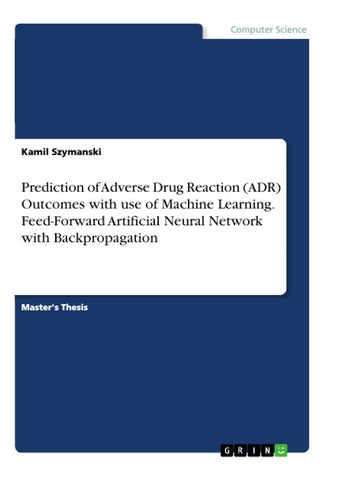| Book Description | Master's Thesis from the year 2019 in the subject Computer Sciences - Artificial Intelligence, grade: 88.2, Institute of Technology Carlow, language: English, abstract: Adverse Drug Reactions contribute to $ 7.2 billion in medical expenses annually in the United States alone. Apart from economic impact, the adverse drug reactions are one of the main causes of deaths in developed countries. An ability to predict adverse drug reaction outcomes or identify patients that are likely to experience adverse drug reactions after ingesting medicinal drug product can reduce the fatality rates and financial burden associated with medical treatments of patients experiencing adverse drug reactions. To date, two studies attempted to predict adverse drug reactions with use of machine learning algorithms and Food and Drug Administration database. However, one of them did not provide sufficient accuracy scores and the other was a small-scale proof of concept study. This research has built on top of these two studies and aimed to improve predictive results and provide more specific adverse drug reaction predictive labels. Two deep, fully connected Neural Networks have been created to predict adverse drug reaction outcomes. Model 7 and the Binary Model. The model 7 was a multi-label classification algorithm that was trained to classify patients that were hospitalised, died or have been hospitalised then died. The binary model was trained to segregate the adverse drug reaction outcomes to 2 classes - hospitalisation and death. The multiclass Model-7 achieved similar performance (74 % accuracy) to standard machine learning (binary) models generated in previous studies. However, it did not achieve better performance than binary proof of concept Artificial Neural Network model built by other researchers. The binary Artificial Neural Network model created in this study, significantly outperformed other binary standard machine learning models designed in past by achieving 83 % of accuracy |
Free & Easy Returns
Best Deals




